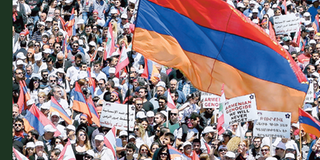OBLIQUE ANGLE : Of causes of genocide ... a response from Turkey

Lebanese Armenians march with flags and placards on the Antelias highway, north of Beirut, on April 24, 2015, to commemorate the 100th anniversary of the mass killings of Armenians under the Ottoman Empire in 1915. PHOTO | FILE
What you need to know:
It is only fair that opposing views supported by evidence or arguments should be given the chance to see the light of day. A couple of weeks ago, we covered a sensitive topic--on genocide. This column was honoured to get a response from the Turkish ambassador to Tanzania, Mr Ali Davutoglu. He shares the official stand of his country, Turkey, on what is often referred to as the Armenian Genocide claimed to have been committed by the Ottoman Empire between 1915 and 1922.
One objective of this ‘column’ is to stimulate debate on various issues of human interest--locally, regionally and globally.
It is only fair that opposing views supported by evidence or arguments should be given the chance to see the light of day. A couple of weeks ago, we covered a sensitive topic--on genocide. This column was honoured to get a response from the Turkish ambassador to Tanzania, Mr Ali Davutoglu. He shares the official stand of his country, Turkey, on what is often referred to as the Armenian Genocide claimed to have been committed by the Ottoman Empire between 1915 and 1922.
Given our editorial space, the response will be run into two parts.
Here is part two.
... Armenians love to start to tell the so-called massacre on April 24, 1915, but they conveniently forget the atrocities committed by them that they had killed 518,000 people in Eastern Anatolia between 1914 and 1921. It is a proven fact by Ottoman documents.
The resettlement of the Armenians took place at a time when the Ottoman Empire was suffering from severe shortage of food, medicine, and other supplies as well as large scale plague and famine. A number of them also died because of disease, climatic conditions and difficulties of travel.
Armenians try to label the deaths during the resettlement process as genocide and bring their claims into the international arena with fabricated figures about deaths.
Furthermore, between 1973 and 1993, 33 Turkish diplomats, employees and families based in Turkish diplomatic missions abroad were murdered by Armenian terrorist groups, with the ASALA being the most infamous one. ASALA memorial was erected in Armenia for the heroization of murderers.
73-year-old Dogu Perincek, is a Turkish national, holder of a doctor of laws degree, and chairs the Turkish Workers’ Party. In 2005, Dr Perincek participated in three public events in Switzerland, in the course of which he expressed the view that the mass deportations suffered by the Armenians living in the Ottoman Empire from 1915 onwards had not amounted to genocide. At a press conference held in May 2005 in Lausanne, Dr. Perincek stated that “the allegations of the ‘Armenian genocide’ are an international lie… Imperials from the West and from Tsarist Russia were responsible for the situation boiling over between Muslims and Armenians. The Great Powers, which wanted to divide the Ottoman Empire, provoked a selection of the Armenians, with whom we had lived in peace for centuries, and incited them to violence.”
Dr. Perincek was convicted of denying genocide. On October 15, 2015, Grand Chamber of the European Court of Human Rights (ECHR) delivered its judgement in the case of Dr. Perincek vs Switzerland. By majority, 17 judges held that there had been a violation of Article 10 (freedom of expression) of the European Convention on Human Rights, perpetrated by Switzerland.
By its criminal conviction of a Turkish politician (Dr. Perincek) for publicly expressing his views on Swiss soil, regarding the “Turkish-Armenian Conflict, Switzerland breached Dr. Perincek’s right to free speech.
This judgement teaches Switzerland and the rest of the world that only “genocides supported by the verdict of a competent court” shall benefit from the protection afforded by the “denial laws”. That is, while the Jewish Holocaust, Rwanda and Srebrenica are protected because they are court-proven genocides, the Armenian claim of genocide is not protected. Disputing an opinion is not hate speech. I enclose herewith 2 books (“Prospects of Turkish-Armenian Relations” and “Review of Armenian Studies No. 32”) give information about relations between Turkey and Armenia.
I hope you will share the reality on Armenian issue with your readers.
Yours sincerely,
Ali Dovutoglu,
Ambassador of Turkey




